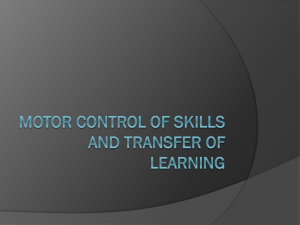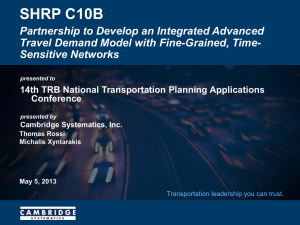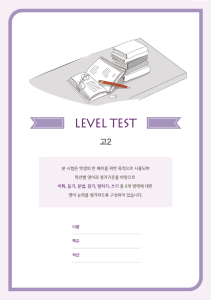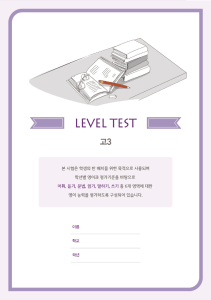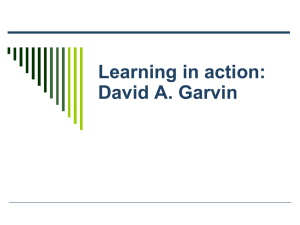Acquiring Movement Skill - AS Physical Education OCR
advertisement
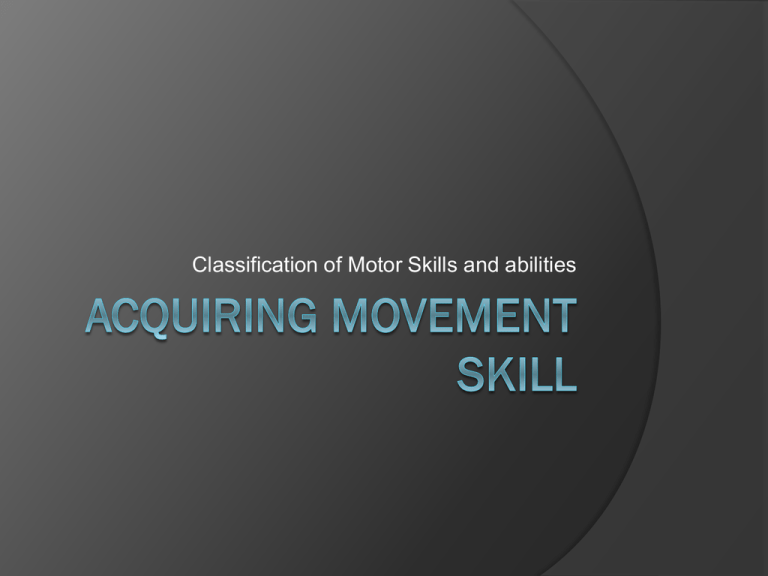
Classification of Motor Skills and abilities Objective: Classify movement skills by placing them on a variety of continua. Task 1 booklets Guess the sport: List five skills for a specific sport. They need to be really specific so we can immediately identify which sport is being described. Sport_____________ Passing, Too vague. Rucking Mauling Drop kicking Place kick Spin pass AS Physical education Acquiring movement skill DTA 2012/13 Task 2: List five words that describe the performance AS Physical education Acquiring movement skill DTA 2012/13 Task 2: List five words that describe the performance AS Physical education Acquiring movement skill DTA 2012/13 list five words that reflect this performance AS Physical education Acquiring movement skill DTA 2012/13 Definition of Skill The learned ability to bring about the predetermined result with the maximum certainty often with the minimum outlay of time energy or both. AS Physical education Acquiring movement skill DTA 2012/13 Skill characteristics Consistent Aesthetic Learned Goal directed Predetermined Organised Recognisable Efficient AS Physical education Acquiring movement skill DTA 2012/13 Consistent Able to execute action with maximum certainty Aesthetic Looks controlled, effective and effortless Goal directed Intention to do it not just luck Organised Efficient Minimum of time and energy Learned Through practice and experience Recognisable AS Physical education Acquiring movement skill Predetermined Have an aim to achieve DTA 2012/13 Intellectual Skill Skills that involve thought process. E.g., problem solving, planning, strategies, tactics to outwit your opponent. In pairs come up with two examples in your own sport. Deciding to kick over instead of run through as the opponent is slow to turn. Other examples could be ……… Formation. AS Physical education Acquiring movement skill DTA 2012/13 Perceptual skill Perception Detecting and interpreting, making sense of information in the environment. I.e., interpreting the speed of the support player you need to pass to. Detecting the speed and direction of a ball as it comes over the net in tennis. Position of others players in a netball game, to judge the flight of a ball. AS Physical education Acquiring movement skill DTA 2012/13 Motor Skill When you see this term think of movement. Skill which involves physical movement and muscular control. Smooth executing movement E.g., passing the ball, shooting, completing a forward roll. AS Physical education Acquiring movement skill DTA 2012/13 Task 4 Look at this video of the number 10/19 and see if you can identify different types of skills. AS Physical education Acquiring movement skill DTA 2012/13 Classification of motor skills AS Physical education Acquiring movement skill DTA 2012/13 Classification of motor skills Many skills have similar characteristics But some skills can also depend on the circumstances so to overcome these as problems in classifying skills we use a continuum. Continuum An imaginary line between two extremes which shows a gradual increase/decrease in the number of characters. AS Physical education Acquiring movement skill DTA 2012/13 Left handed Left footed Play team sport Skill Right handed Right footed Play individual sport fitness AS Physical education Acquiring movement skill Which sports have large muscle movements and which have fine? DTA 2012/13 Muscular involvement- GrossFine Continuum. This is based on the degree of the bodily involvement and the precision of the movement needed to execute the skill. Gross skill Describe what this is. Involves large muscle movement and little need for precision. Large muscle groups AS Physical education Acquiring movement skill DTA 2012/13 Muscular involvement- GrossFine Continuum. Fine Control Involves intricate movement using small muscle groups. Can you think of sports or action that need this fine control? Involves accuracy and emphasis, hand-eye coordination. Wrist, finger action of spin bowler, shooting, throwing a dart. AS Physical education Acquiring movement skill DTA 2012/13 Your sports. Look at the continuum on page 8 and place a skill from your sport on the continuum Draw the continuum on the white boards and then place each of the 7 skills. Pick two of the skills and justify the reason you have placed them in that position on page 8. AS Physical education Acquiring movement skill DTA 2012/13 Environmental We OPEN are concerned with how environmental conditions affect the movement skill. Taking into account surroundings, team mates, opponents. This can also be weather. So take the actions and place them on the continuum. Remember to justify why you have places them where you have. AS Physical education Acquiring movement skill CLOSED PASSING RUGBY DTAIN 2012/13 Criteria for Environmental Influence Involves motor skills affected by environment Perceptual and involve decision making (adaptations and variations) Externally paced in an unpredictable environment. E.g., Passing in rugby, receiving a ball in netball. Open Skill Motor skill not affected by environment Skill habitual-aim is to reproduce same technique model. Self paced Forward roll, gymnastics through vault, tennis serve. Closed Skill Task on page 9. Justification for selection using the right terminology. Ensure you are specific with example and justification. If it’s vague you won’t get marks. AS Physical education Acquiring movement skill DTA 2012/13 Continuity Continuum Discrete, serial, continuous Discrete Skill Motor skill that has a clear start and finish. To be repeated it must start again, (single brief skill) E.g.,…….. AS Physical education Acquiring movement skill DTA 2012/13 Serial Skill A motor skill that has a number of discrete skills put together in a set order to make the sequence. What example can you think of? AS Physical education Acquiring movement skill DTA 2012/13 Continuous Motor skill with no definite beginning or end End of one cycle of movement is start of next. Movement to be repeated several times to mean anything. AS Physical education Acquiring movement skill DTA 2012/13
